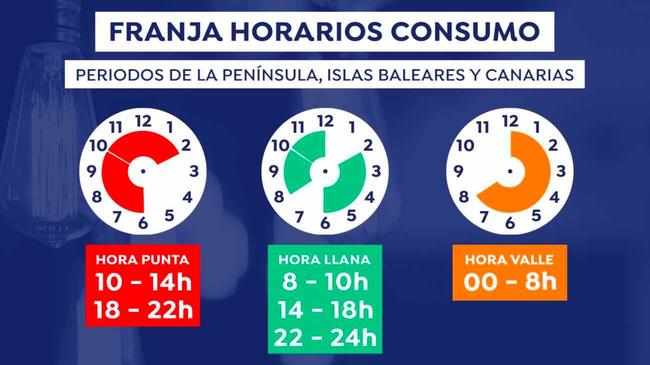Electric bill At what time do I have to put on the washing machine to save with the new rates?
Remember to look at the clock to avoid scares!, can be read in the guide that the Union of Consumers of Extremadura has prepared on the new electricity rate, which comes into force next Tuesday, June 1. As has already been explained, three time slots and two different powers are established for the small consumer. So, at what time do I have to put a washing machine or a dishwasher so that it works out cheaper?
New rates for sections
The most economical thing is to put this type of appliance in the 'valley' section, that is, from midnight to eight in the morning, or at any time on a Saturday, Sunday or national holiday.
The 'peak' period is the most expensive section. The schedule is between 10 in the morning and two in the afternoon, and between six in the afternoon and ten at night.
In between, the 'flat' section, which runs from eight to ten in the morning, between two and six in the afternoon, and between ten and twelve at night.
The objective pursued is to encourage the displacement of consumption and that precisely this type of action, such as washing clothes or dishes, is moved to periods of lower demand. This also makes it easier, for example, to charge an electric vehicle at a reduced price, either at home or by contracting a second supply point. In this case, the difference between charging the electric vehicle at any time of the day or at night exceeds 300 euros per year, estimates the National Commission for Markets and Competition (CNMC).
Among other things, it is recommended not to turn on all the devices at the same time, something that could translate into savings of between 200 and 300 euros.
Is the savings real?

Experts say that the effects will depend on each household, but that this new rate "will reward consumers who change their habits to adapt to the proposed schedules." In this way, putting a washing machine on a Sunday would be up to two and a half times cheaper than doing it on a weekday at noon.
The price for the power contracted in the 'valley' section is 95% lower than that of the most expensive period, according to the National Commission for Markets and Competition, CNMC. For its part, the price of the energy term in the intermediate period is 69% less than the peak. In the case of the 'valley', it is 95% less than the price of energy in the most expensive section.
The new tariff will allow the consumer to choose two powers, one for the cheapest period and another for the most expensive, while until now only one maximum power could be had. The CNMV gives the following example: if we have contracted a power of 3.95 kilowatts and we do nothing, the distributor will consider the same power for the 'peak' and 'off-peak' periods, but the analysis says that in the peak period it demands 3.50 kW and in the off-peak period, 2.3 kW, so by adjusting the power, savings of more than 16 euros per year could be obtained.
Related news
The electricity bill changes on June 1: how we should adapt our consumption to save
What does the OCU say?
The Organization of Consumers and Users, OCU, indicates that a home with less than 10 kilowatts of contracted power and that keeps it unchanged will pay 16% less for it and that the savings will be greater for those who have contracted between 10 and 15 kw, because the fixed part of the receipt will drop by 28%. This reduction, explains the group, is offset by an increase in the price per kilowatt.
The highlight, however, is trying to take advantage of the opportunity to carry out tasks that require higher consumption during the weekend, such as ironing, using the oven or putting on the dryer. Regarding the charging of the car, the OCU estimates that a household that had contracted 7 kW would pay 339 euros per year with the old system, while with the new bill, taking advantage of the fact that power could be increased only during off-peak hours, it would be 135 euros per year, which represents a saving of more than 200 euros.










Related Articles